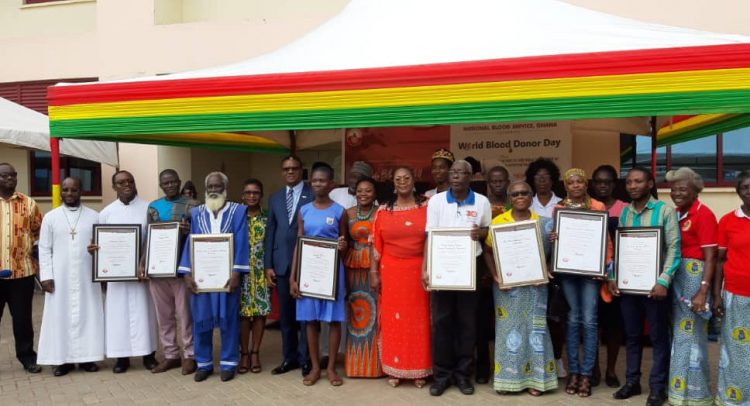The Award winners with the dignitaries in a group photo.
In its quest to reduce the over reliance on family replacement blood donations, the National Blood Service (NBS) has begun the implementation of a programme to increase access to voluntary and safe blood transfusion in Ghana.
The programme dubbed: the National Blood Supply Strengthening Programme (NBSSP), would among others, address concerns about safety of donors and receipts of blood and blood products in health facilities and increase access to safe and quality blood services in the country.
Chief Executive Officer of the National Blood Service, Dr. Justina Kordai Ansah, who disclosed this at the commemoration of World Blood Donor Day in Accra, said key performance areas of the NBSSP includes expanding blood service infrastructure, intensifying advocacy and collection of blood from voluntary donors, and deepening collaboration with other stakeholders to improve voluntary blood donation.
The implementation of the programme, she said, would help the service meet its ambitious target of increasing the proportion of voluntary blood donations from the current low level of 37 per cent to 75 per cent within the short-to-medium term.
In 2018, Ghana’s estimated national blood requirement was 280,000 units.
The total blood collected nationwide was a little above 169,000 units.
Of this total, about 37 percent were collected from voluntary, unpaid donors.
Most of the voluntary donations were collected by the three Zonal Blood Centres of the National Blood Service of Accra, Kumasi and Tamale.
Dr. Ansah noted that blood transfusion was an indispensable intervention in healthcare care delivery system which contributes to saving thousands of lives each year in routine and emergency cases.
“A functional national blood supply system that relies on regular blood donations by voluntary donors from low risk populations is therefore a prerequisite for achieving self-sufficiency in safe blood and blood products in Ghana,” she said.
However, the national blood supply system continued to rely heavily on replacement donations by family relations and friends of patients who require blood transfusions, she added.
Dr. Ansah therefore noted that the service had initiated steps to upgrade blood banks of selected Regional Hospitals into Sub-Zonal Blood Centres to provide safe blood and blood products to other public and private hospitals within their catchment zones.
She also added her voice to the call for the blood processing fee to be covered by the National Health Insurance Scheme (NHIS).
According to her, “a workable financing arrangement could be made to replace the current out-of-pocket payment of processing fees by patients or their relatives.
“This will undoubtedly increase the supply of safe blood through voluntary donations and make blood and blood products, which are now classified as essential medicines, available when needed in emergency cases,” Dr. Ansah stated.
World Blood Donor Day
June 14 each year is observed as World Blood Donor Day.
The event is celebrated around the world to thank voluntary, unpaid blood donors for their live-saving gifts of blood.
This year’s theme: “Safe blood for all”, draws attention to the crucial role that voluntary blood donations play in achieving the goal of Universal Health Coverage (UHC).
The occasion is also used to raise awareness for regular blood donations to ensure access to affordable and timely supplies of safe and quality blood and blood products by patients.
During the commemoration, citations and awards were given to institutions, faith-based organizations and corporate organizations for their contribution towards voluntary blood donation.
BY Jamila Akweley Okerthiri & Sarah Platz

